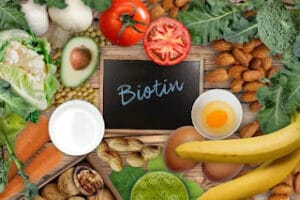Biotin Benefits
Biotin, also known as vitamin B7 or vitamin H is a water-soluble vitamin that plays a significant role in maintaining overall health and well-being. Often it also called “beauty vitamin,” biotin is renowned for its positive impact on hair, skin, and nail health. However, its benefits extend far beyond aesthetics. Biotin is essential for metabolic processes, aiding in the breakdown of carbohydrates, fats, and proteins to generate energy. Additionally, it supports brain function, cardiovascular health, and muscle development. Unlike fat-soluble vitamins, biotin is not stored in the body for long periods, meaning a consistent dietary intake is necessary to prevent deficiencies. While most people obtain sufficient biotin from a well-balanced diet, certain individuals such as pregnant women, those with digestive disorders, or people on prolonged medication use may require supplementation to meet their nutritional needs.
This article explores the additional role of biotin in the body along with benefits of biotin for aesthetic purpose, its natural sources, symptoms of deficiency, benefits of supplementation, and potential risks, providing a comprehensive understanding of why this essential nutrient is a key player in overall health.
Benefits of Biotin for Hair, Skin, and Nails
Biotin is often associated with beauty and personal care due to its significant impact on hair, skin, and nails. Below are the key benefits:
Hair Health
Promotes Hair Growth
Biotin plays a key role in the production of keratin, the primary protein that makes up hair strands. Regular intake may help accelerate hair growth and improve hair density.
Reduces Hair Loss
Biotin deficiency is linked to hair thinning and hair loss. Supplementation or a biotin-rich diet may help restore hair strength and reduce excessive shedding.
Prevents Brittle Hair
It enhances hair elasticity and resilience, reducing breakage and split ends.
Improves Scalp Health
Biotin supports the health of hair follicles, helping prevent dandruff and dry scalp conditions.
Skin Health
Maintains Hydrated and Glowing Skin
Biotin supports fat metabolism, which is essential for maintaining skin hydration and a youthful glow.
Reduces Skin Conditions
Deficiency in biotin can lead to skin disorders such as acne, rashes, and dermatitis. Adequate biotin intake helps prevent and reduce these conditions.
Promotes Skin Cell Regeneration
Biotin aids in the formation of new skin cells, promoting faster healing of wounds and blemishes.
Reduces Inflammation
It has anti-inflammatory properties that may help alleviate redness, irritation, and conditions like eczema and psoriasis.
Nail Health
Strengthens Brittle Nails
Biotin enhances the structure of keratin in nails, making them stronger and less prone to splitting or breaking.
Promotes Nail Growth
Regular biotin intake has been shown to improve nail growth speed and thickness.
Prevents Peeling and Cracking
Biotin helps maintain moisture levels in nails, preventing dryness and cracking.
Additional Role of Biotin in the Body
Biotin is a coenzyme involved in the metabolism of carbohydrates, fats, and proteins. It helps convert these macronutrients into energy, making it vital for overall bodily function. Biotin contributes to:
Metabolic Function
It assists in breaking down food into usable energy and supports enzyme function that facilitates the metabolism of amino acids, fatty acids, and glucose.
Blood Sugar Regulation
Some studies suggest that biotin helps regulate blood sugar levels, especially in people with diabetes, by improving insulin function.
Nervous System Support
Biotin plays a role in neurotransmitter function, which impacts brain health, cognitive performance, and mood regulation. It is believed to help reduce the risk of neurological disorders.
Improved Cognitive Function
Due to its role in neurotransmitter activity and nerve signaling, biotin may help enhance focus, memory, and overall brain function.
Heart Health
Biotin is thought to aid in lowering bad cholesterol (LDL) levels, which may support cardiovascular health.
Muscle and Tissue Health
Biotin supports tissue and muscle repair, making it beneficial for muscle strength and recovery, particularly in physically active individuals.
Pregnancy and Fetal Development
Adequate biotin levels are necessary for proper fetal growth and development during pregnancy. It supports embryonic growth and contributes to cellular function.
Who Needs Biotin?
While biotin is essential for everyone, certain individuals are more likely to require additional biotin through diet or supplements:
Pregnant and Breastfeeding Women
Increased biotin demand during pregnancy and lactation makes supplementation beneficial for fetal development and maternal health.
People with Biotin Deficiency
Those with genetic disorders affecting biotin metabolism or absorption may require biotin supplementation to prevent health complications.
Individuals with Hair Loss and Brittle Nails
People experiencing hair thinning, excessive shedding, or weak and brittle nails may benefit from higher biotin intake.
People with Skin Issues
Those suffering from dry skin, rashes, acne, or eczema may find biotin helpful in improving skin hydration and reducing inflammation.
Patients with Digestive Disorders
Individuals with conditions like Crohn’s disease, celiac disease, or irritable bowel syndrome (IBS) may have impaired biotin absorption and require supplementation.
Diabetics
Biotin may aid in regulating blood sugar levels and improving insulin function, making it beneficial for diabetics.
Athletes and Active Individuals
Due to increased energy demands and muscle recovery needs, physically active individuals may require higher biotin intake.
Older Adults
Aging can affect nutrient absorption, making seniors more susceptible to biotin deficiency.
Chronic Alcohol Consumers
Excessive alcohol intake can impair biotin absorption and metabolism, increasing the risk of deficiency.
People on Long-Term Medications
Certain medications, such as antibiotics, anticonvulsants, and isotretinoin (used for acne treatment), can interfere with biotin absorption and metabolism.
Here are some natural sources of biotin
Animal-Based Sources
Egg Yolks: Rich in biotin, but best consumed cooked to prevent absorption issues.
Liver & Organ Meats: Beef, chicken, and pork liver are among the highest biotin sources.
Fatty Fish: Salmon and tuna provide biotin along with omega-3s.
Dairy Products: Milk, cheese, and yogurt contain moderate amounts of biotin.
Plant-Based Sources
Nuts & Seeds: Almonds, walnuts, and sunflower seeds are biotin-rich snacks.
Legumes: Chickpeas, lentils, and soybeans offer biotin and plant protein.
Whole Grains: Oats, barley, and whole wheat retain biotin in their natural form.
Vegetables: Sweet potatoes, spinach, broccoli, and mushrooms contain small but beneficial amounts.
Fruits: Avocados, bananas, and berries provide trace amounts.
Fermented and Yeast-Based Foods
Brewer’s Yeast & Nutritional Yeast: These are highly concentrated sources of biotin and are often used as supplements or food enhancers, particularly for plant-based diets.
Recommended Biotin Dosage For supplementation
The recommended biotin intake varies based on age, gender, and health needs. Below are general dosage guidelines:
Adults and teenagers: 30-100 mcg per day (adequate for general health and well-being).
For Hair Growth and Strengthening: 2,000-5,000 mcg per day (often used in supplements for hair growth support).
For Skin Health: 500-5,000 mcg per day, depending on individual needs and deficiency levels.
For Stronger Nails: 2,500-3,000 mcg per day has been found effective in reducing nail brittleness.
Pregnant Women: 30 mcg per day (recommended to support fetal development).
Breastfeeding Women: 35 mcg per day.
Conclusion
Biotin is a vital B vitamin that supports metabolic functions, hair and nail health, nervous system activity, heart health, and cognitive function. While it is naturally available in many foods, supplementation may be beneficial for those with deficiencies or specific health conditions. Ensuring a balanced diet rich in biotin-containing foods is the best way to maintain adequate levels and promote overall well-being. While biotin is generally safe, excessive intake may lead to minor side effects such as skin rashes or digestive discomfort. It is best to consult a healthcare provider before starting high-dose supplementation.

